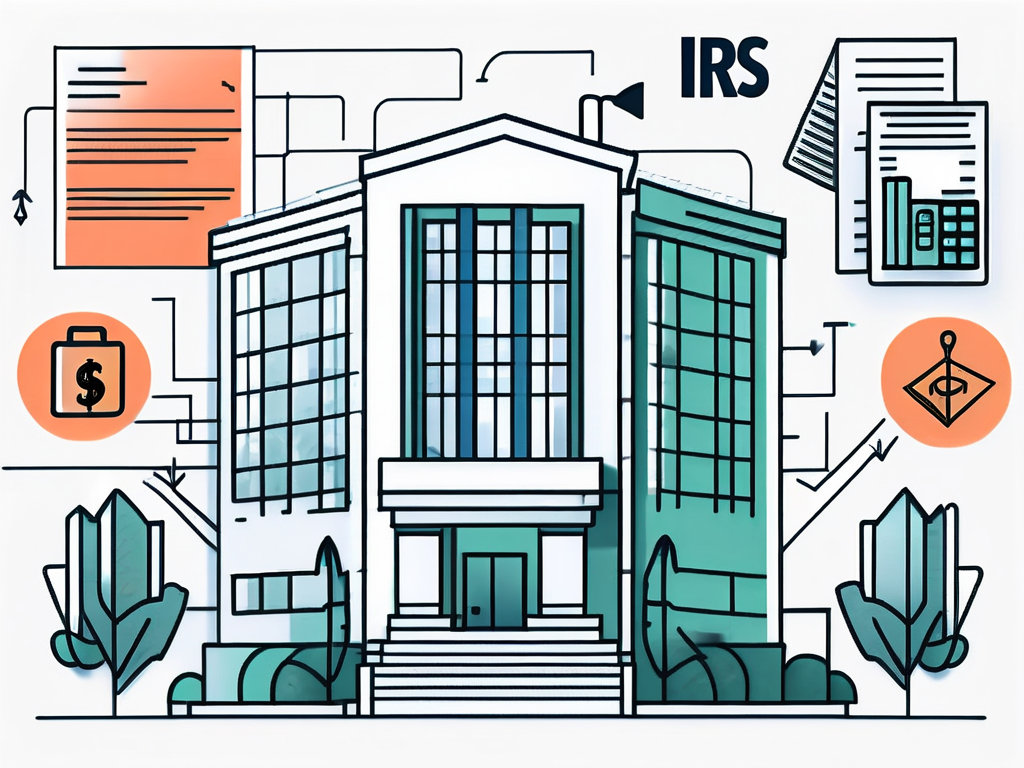Uncover the methods the IRS uses to track rental income and ensure compliance. Let's get into it.
rEAD MORE

Understanding the intricacies of rental income taxation can be daunting, especially when considering the role of the Internal Revenue Service (IRS). Many rental property owners often wonder, "How does the IRS know if I have rental income?" This article explores the mechanisms behind IRS information gathering about rental income, reporting requirements, and implications of non-compliance.
The IRS plays a significant role in ensuring that taxpayers report their income accurately, including those who earn rental income. They are tasked with enforcing tax laws and collecting revenue, which necessitates thorough oversight of various income sources, including rental properties.
The primary function of the IRS is to administer and enforce federal tax laws. This includes collecting taxes on income earned from various sources, such as wages, investments, and, importantly, rental properties. By monitoring income, the IRS can ensure fair taxation and compliance.
In order to maintain control over the taxation landscape, the IRS employs various strategies to track income sources. These include audits, data matching, and direct reporting from taxpayers. The agency's efficiency hinges on a robust information network that connects multiple sources of financial data. This interconnected system allows the IRS to identify discrepancies and ensure that all income is reported accurately, thereby safeguarding the integrity of the tax system.
Rental income, according to the IRS, is any payment received for the use or occupation of property. It encompasses not only payment received from traditional rental scenarios but also payment for use of property, such as a vacation home or rental through online platforms like Airbnb and Vrbo.
Additionally, the IRS considers various forms of rental income, including monthly rent, advance rent payments, and security deposits if they are not returned to the tenant. Being aware of what constitutes rental income is crucial for accurate reporting on tax returns. Furthermore, landlords should also be cognizant of the expenses that can be deducted from their rental income, such as mortgage interest, property tax, and maintenance costs. Understanding these deductions can significantly impact the overall tax liability and provide a clearer picture of the net income generated from rental activities.
Moreover, the IRS has specific guidelines regarding the treatment of rental income from short-term rentals versus long-term leases. For instance, if a property is rented out for fewer than 15 days in a year, the income may not need to be reported, allowing homeowners to benefit from tax-free rental income. However, if the rental period exceeds this threshold, all income must be reported, and the landlord must adhere to the standard tax regulations applicable to rental properties. This distinction is essential for property owners who engage in short-term rentals, as it can influence their tax strategies and financial planning significantly.
The IRS utilizes several information-gathering methods to track whether taxpayers are accurately reporting their rental income. These methods include standard forms and data collected from various entities that interact with a taxpayer's income.
One of the standard forms used by the IRS to gather information about rental income is Form 1099. This form is used to report miscellaneous income and is typically issued by businesses or platforms that make payments to individuals outside of traditional employment. For instance, if a vacation rental platform pays you for rentals, they may issue a Form 1099 to both you and the IRS.
This form informs the IRS of the amount you received, providing a clear trail that may trigger review if not reported on your tax return. Hence, if you receive this form, it is essential to include that income on your tax filings. Additionally, it's important to note that the IRS has been increasingly vigilant about ensuring compliance with reporting requirements, especially as the gig economy grows. As more individuals engage in short-term rentals or freelance work, the IRS's scrutiny of Form 1099 submissions has intensified, making it crucial for taxpayers to maintain accurate records of their income and expenses.
Besides Form 1099, the IRS also relies on third-party reporting to track income. This includes information provided by financial institutions, landlords, and property management companies. When rental properties are managed through these companies, they often report rental payments to the IRS, creating an additional layer of accountability for rental property owners.
This systematic exchange of information helps the IRS create a comprehensive profile of taxpayers, reducing the likelihood of income unreported by taxpayers, which can lead to audits or penalties. Moreover, the IRS has implemented various technologies and data analytics tools to enhance its ability to analyze the vast amounts of data it receives from these third parties. By cross-referencing data from different sources, the IRS can identify discrepancies and patterns that may indicate underreporting or tax evasion. This proactive approach not only serves to ensure compliance but also reinforces the importance of accurate reporting for taxpayers, who may otherwise find themselves facing unexpected audits or financial repercussions.
Correctly reporting rental income is essential to maintain compliance with tax regulations. It's not merely a good practice; it’s a legal requirement that comes with serious implications if ignored.

If you earn rental income, the IRS mandates that you report it on your tax return. This income must be declared on Schedule E, which is used to report income or loss from rental real estate. Even if you have rental losses that offset your income, you still need to report your gross rental income.
Failing to report this income could attract penalties and interest charges, which can add up significantly over time. Accurate documentation and timely reporting are vital to keep your financial standing in good shape with the IRS. It's advisable to maintain detailed records of all rental transactions, including lease agreements, payment receipts, and any correspondence related to the rental activity. This not only helps in accurate reporting but also serves as a safeguard in the event of an audit.
The repercussions of not reporting rental income can be severe. If the IRS detects that you have failed to report income, you could face an audit. In addition to back taxes owed, you might incur penalties that can reach 25% of your unpaid taxes or more in egregious cases of tax evasion.
It's also worth noting that hiding income may lead to a loss of future tax benefits and deductions associated with rental properties. For instance, you may miss out on deductions for depreciation, repairs, and other expenses that can significantly reduce your taxable income. Being transparent and compliant is critical to safeguarding your financial health when dealing with the IRS. Moreover, understanding the nuances of rental income reporting can empower you to make informed decisions about your investments, ensuring that you maximize your returns while staying within the legal framework.
While reporting your rental income is necessary, it's equally important to understand the deductions and expenses associated with it. The IRS allows landlords to deduct specific costs, which can significantly lower taxable income.
Landlords qualify for numerous deductibles, including property management fees, maintenance, repairs, insurance, and mortgage interest. Depreciation is another valuable deduction that allows you to recover the cost of the property over time. This deduction is calculated based on the property's useful life, which the IRS typically sets at 27.5 years for residential rental properties. By spreading the cost of the property over this period, landlords can significantly reduce their taxable income year after year.
To maximize your deductions, it’s crucial to keep accurate records of all expenses associated with your rental property. Items such as travel expenses related to managing the property can also count if documented correctly. Additionally, utilities paid on behalf of tenants, advertising costs to find new renters, and even legal fees incurred for lease agreements or evictions can be deducted. Keeping meticulous records not only helps in claiming these deductions but also provides a clear financial picture of your rental business.
In situations where rental expenses exceed rental income, landlords can report a rental loss, which can reduce overall taxable income. In some cases, this can be used to offset other sources of income, depending on your income level and specific circumstances. For instance, if you have a full-time job and your rental property incurs significant expenses, the losses can help lower your overall tax burden, potentially placing you in a lower tax bracket.
The IRS has set specific guidelines surrounding passive activity loss rules, which may limit the extent to which rental losses can offset other income. Understanding these nuances is vital for effectively managing your tax liabilities. For example, if you actively participate in managing your rental property—such as making repairs or handling tenant issues—you may qualify for special exemptions that allow you to deduct losses against your ordinary income. This distinction can be crucial for landlords who are looking to optimize their tax strategy while navigating the complexities of rental income taxation.
The prospect of an audit can be overwhelming for any taxpayer. However, understanding how the IRS conducts audits related to rental income can help you better prepare and navigate the process if it arises.
Audits can take several forms, from simple correspondence audits to in-person examinations. When auditing rental income, the IRS may analyze how you reported your income against different forms and external data sources.
They may request documentation including leases, bank statements, and receipts for all claimed deductions. The thoroughness of such reviews can be daunting, making it necessary to keep impeccable records throughout the year. Furthermore, the IRS may also cross-reference your reported income with information from tenants or property management companies, which underscores the importance of accuracy in your financial reporting.
Preparing for a potential IRS audit involves maintaining organized records and documentation. Ensure you have copies of all relevant documents readily available, such as tax returns, income reports from platforms or entities, and expense records associated with your rental property.
Consider consulting with a tax professional who can guide you through the audit process and help resolve any discrepancies with minimal stress. They can also offer strategies to avoid future audits by ensuring that all income and deductions are reported accurately. Additionally, staying informed about changes in tax laws and regulations is crucial, as the IRS often updates its policies, which may affect how rental income is reported and taxed. This proactive approach not only helps in the event of an audit but also enhances your overall financial literacy as a property owner.
Successfully navigating rental income taxation requires diligence, knowledge, and sometimes professional assistance. Keeping up with changing tax laws and maintaining accurate records can be challenging, but it's essential to tax compliance.

Some practical tips include creating a dedicated filing system for rental income and expenses, regularly updating financial records, and staying informed about tax law changes that may impact your obligations.
Utilizing accounting software designed for property management can also simplify tracking rental income and expenses, reduce errors, and save time. This proactive approach can help you keep your financial situation healthy. Additionally, it’s beneficial to categorize your expenses clearly, distinguishing between necessary repairs, maintenance costs, and improvements, as this can significantly affect your taxable income. For example, while repairs can often be deducted in the year they are incurred, improvements may need to be capitalized and depreciated over time, impacting your tax strategy.
If you find rental income reporting overwhelming, consider seeking help from a qualified tax professional. They have the expertise to navigate complex tax laws and help you maximize deductions while ensuring compliance.
Professional tax advisors can also provide peace of mind, allowing you to focus on managing your property rather than worrying about potential tax consequences. By investing in professional guidance, you can be better prepared for tax season and audits. Furthermore, a knowledgeable tax advisor can assist you in understanding the implications of different rental structures, such as short-term versus long-term rentals, and how they may affect your tax obligations. They can also advise on the tax benefits of depreciation, which can significantly lower your taxable income over time, making it a crucial aspect of rental property management.
Understanding how the IRS tracks rental income is crucial for anyone involved in renting property. By recognizing the responsibilities associated with reporting this income and the ramifications of failing to comply, property owners can better manage their tax obligations and minimize financial risks.
Being audited is comparable to being struck by lightning. You don't want to practice pole vaulting in a thunderstorm just because it's unlikely. Making sure your books are accurate and your taxes are filed on time is one of the best ways to keep your head down during tax season.
💡Let's chat!

This post is just for informational purposes and is not meant to be legal, business, or tax advice. Regarding the matters discussed in this post, each individual should consult his or her own attorney, business advisor, or tax advisor. Vincere accepts no responsibility for actions taken in reliance on the information contained in this document.
For business tax planning articles, our tax resources provides valuable insights into how you can reduce your tax liability now, and in the future.
Copyright © 2025 Vincere Tax| All Rights Reserved
Privacy Policy